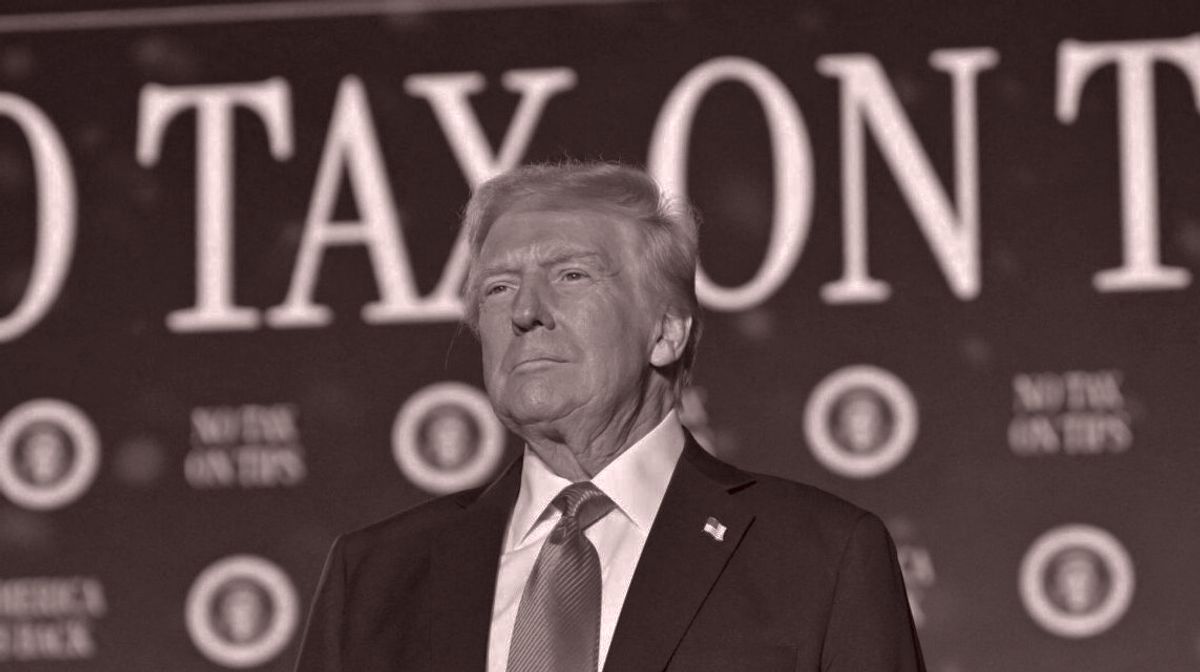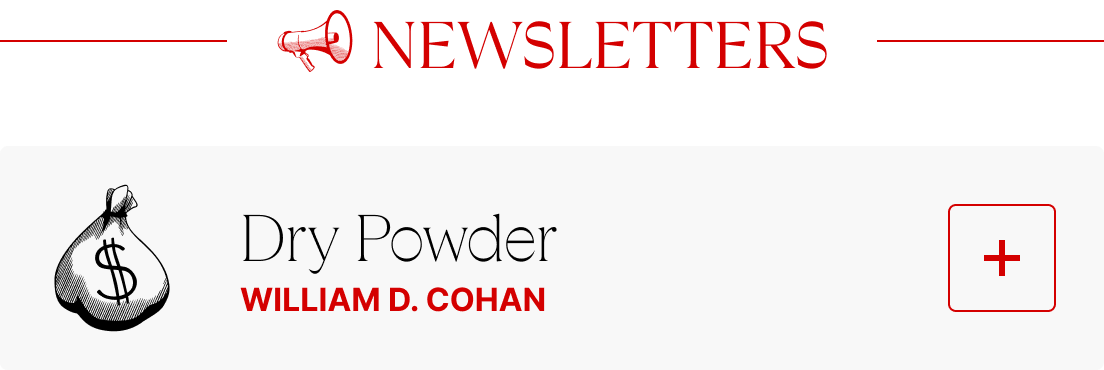Hello and welcome back to The Best & The Brightest. I’m Leigh Ann
Caldwell, taking you on this ride during one of those glorious light-traffic weeks in D.C.—both school children and Congress are out on spring break.
Today, I’m bringing you the conversations that Republicans are having behind closed doors about raising taxes on the wealthiest Americans. Of course, this has long been blasphemy in Republican politics—an idea so inflammatory that few would dare utter it aloud. But it’s another example of the great political realignment in
the age of Trump. The president’s decision to own the populist-friendly tax-the-rich position could deprive the Democrats of yet another popular issue… if he decides to see it through.
If you’re one of those people who still reads the first three paragraphs of these daily emails before hitting the paywall, it’s time to enjoy the full Puck experience! Trust me: Puck
will make you smarter, wealthier, and better looking. As Puck subscribers know well, the best stuff is below the fold. So stop missing out and subscribe. I promise you won’t regret it. You can afford it, but can you afford to live without it?
Let’s get started…
|
Will New York vote red?: New York Rep. Elise Stefanik is not-so-subtly floating a run for governor and has already run the idea by key New York Republicans, I’m told, to gauge their potential support. “Elise is a powerhouse. A smart, dedicated leader who would certainly work to make New York affordable and safe again,” former Rep. Marcus Molinaro texted me. Trump also praised her, posting on Truth Social this
morning, without any other context, that Stefanik is “Great!!!”
It’s the latest development in Stefanik’s mostly upward career trajectory after she was blindsided by the president’s decision to pull her nomination to be ambassador to the United Nations last month. The rationale was ostensibly to maximize Republican votes in the House, but Speaker Mike Johnson currently has the largest margin he’s enjoyed in months after the deaths of two Democrats. And pulling
her nomination just days before two special elections in Florida, instead of waiting to see the results, was doubly puzzling. (Of course, Trump’s strategies, such as they are, aren’t always clear.)
Anyway, if she runs, it could be a competitive and interesting primary in a state that hasn’t elected a Republican governor since George Pataki, whose three terms ended in 2007. Stefanik, who has remade herself over the years as a staunch Trump supporter, will
want the president’s endorsement in a competitive primary that’s likely to include Rep. Mike Lawler, who has been positioning himself as a centrist.
Lawler would be well positioned to win the primary, one New York Republican tells me, a signal that no candidate will easily run away with the nomination. Can a Republican win the general election, though? Well, the state did move right in the last election, when Trump lost New York by just under 13
points, compared to 23 points in 2020. Maybe the 2024 rightward shift was a fluke. Or maybe not.
- Democrats’ unemployment line: There’s no denying it: D.C. is now a Republican town. Three months after President Joe Biden left office and Republicans took control of Congress, a glut of out-of-work Democrats are still wandering the streets, flooding employed Democrats with calls and emails looking for work at a level that is
both depressing and overwhelming, Democrats say. Staffers know full well the risk of four years in the wilderness if their boss or party loses, which is part of the thrill and driving motivation of winning elections. But I’ve lived through many political transitions and, anecdotally at least, it seems worse this year than in transitions past—including after Trump left office in disgrace in 2021 and his loyalists struggled to find jobs.
Some speculate that Trump’s thirst for
revenge against Democrats, especially Biden alums, is dampening hiring at law, lobbying, and public relations firms, especially for senior positions, but also further down the org chart. Trump, after all, has pulled security clearances for former Biden officials, pressured law firms to cater to him, extracted multimillion-dollar settlements from media companies, and tried to assert control over private universities, even in
hiring decisions. It’s a trickle-down fear economy these days. Even private-sector Washington—just like Big Tech, Wall Street, and many other sectors—is trying to keep out of Trump’s crosshairs.
|
|
|
The G.O.P. is contemplating the once unthinkable, at Trump’s suggestion: a higher
tax rate on the wealthiest Americans. Backing such a policy would signal a “reality altering” shift for the no-new-taxes party. It would also be among the stranger things to have happened in the increasingly strange Trump era.
|
|
|
In recent weeks, Donald Trump has again broached a once-unthinkable
topic. No, not tariffs on allies or extorting white shoe law firms or threatening a federal takeover of Harvard University. More jarring, from the perspective of Republicans on Capitol Hill, has been the president’s argument for raising taxes on the wealthy.
Trump floated the idea recently in a meeting with top Senate Republicans, ostensibly as a way to offset other, more populist tax cuts he promised on the campaign trail, like no tax on tips. Republicans, of course, are under
enormous pressure to cover the multitrillion-dollar cost of extending Trump’s 2017 tax cuts. Most have been studying ways to cut at least $1 trillion of federal spending (or more, or less, depending on which Republican you ask). Only a small minority of Republicans support the idea of raising taxes on high-income earners, which is anathema to everything the party has long professed to stand for. But stranger things have happened than lawmakers getting comfortable with a policy they once
reviled.
Ever since their meeting with the president, Senate Republicans have been feverishly discussing the details of how raising taxes on the top 1 percent could work. The ideas that have been floated include raising the top tax rate from 37 percent to 39.6 percent—the rate during the Obama years—for those making more than $609,000 per year, and creating a new, slightly higher tax bracket for those making more than $1 million. Potential supporters of the plan suggest
that a 2 percent increase on the highest earners would barely be felt. Republicans have also discussed closing the loopholes for carried interest and dividends, I’m told, though they have been truly sacred cows.
Some populist-oriented Republicans and deficit hawks are open to the idea, and some have even argued for it. Both Rep. Andy Harris, the chair of the hardline Freedom Caucus, and Senator Josh Hawley, for instance, have said they’re in this camp. Supporters note that letting tax rates rise for the wealthy could help offset the cost of extending Trump’s other tax cuts or blunt the need to pay for them. They could also help pay for other Trump tax priorities, such as no taxes on tips or Social Security. Raising taxes on the wealthy could
raise hundreds of billions to more than a trillion dollars in revenue, depending on the policy. The right-leaning Manhattan Institute estimates that taxing capital gains and dividends at 39.6 percent would raise another $330 billion.
House Speaker Mike Johnson has downplayed the idea, telling Fox News last weekend that he’s “not a big fan” of raising taxes on the wealthiest. But it was notable that he didn’t dismiss the possibility outright. After all, if Trump wants to
go for it, Johnson is hardly going to torch their relationship to go to bat for billionaires. And Johnson has already capitulated repeatedly on issues that the party once considered sacrosanct, like standing up for free trade and projecting American power throughout the world.
Raising taxes on the wealthy, then, would be just another Rubicon to cross—the latest step in Trump’s ongoing political realignment. “God put Republicans on planet Earth to cut taxes,” political strategist
Brad Todd told me, quoting the late conservative columnist Robert Novak. President George H.W. Bush’s failure to uphold his “no new taxes” pledge helped make him a one-term president, and Republicans still sign Grover Norquist’s no-tax-hikes pledge—six newly elected senators and 28 House members did so this year.
It would be a
“reality altering” paradigm shift if Republicans became the party of taxing the rich, Biden’s top economic advisor Jared Bernstein told me. “It used to be that Democrats tried to sound like Republicans on taxes to win voters. Now, Republicans are trying to sound like Democrats,” said Democratic strategist Jesse Ferguson.
|
Whispers
of the Bannon Crowd
|
Of course, it’s entirely unclear if Trump is really interested in raising taxes on the
wealthy, or if the whole discussion is a Bannon-esque fantasy. It could be a trial balloon, or a play to challenge the Democrats’ narrative that Trump will plunder Medicaid to cut taxes for the rich, or both.
Regardless, it’s likely not a coincidence that it polls really well. Pew Research recently found that 74 percent of Democrats and Democratic-leaning independents support raising taxes on those making over $400,000 per year. Even 43 percent of Republicans and
Republican-leaning independents were in favor, a significant number that climbs even higher for lower-income Republicans, 48 percent of whom said taxes should be increased for those making over $400,000. A slim majority (51 percent) said they support higher taxes on large businesses, too.
But most G.O.P. senators contend that, given the present economic uncertainty, now is not the time to even consider asking the people who contribute the most economically to pay more taxes, an
argument they make privately during these discussions, too. Behind closed doors, Sen. Tim Scott has argued that it’s the poorest Americans who suffer the most when the wealthy pay more taxes because of how much they impact the market and job creation, according to a person familiar with Hill Republicans’ internal debate. (Scott’s office did not respond to a request for comment.) Beyond the Hill, Josh Holmes, the co-host of the Ruthless
podcast and a former top advisor to Senate Republican leader Mitch McConnell, warned against supporting higher taxes on the wealthy, posting on X that the idea is not populist but instead “an advancement of progressive left’s [sic] agenda.” The limited-government group Club for Growth says they are “unequivocally opposed” to lifting the tax rate of any bracket, calling it a “red line” and promising to track members who support it—essentially a threat to fund primary
opponents.
Meanwhile, no Democrat I’ve spoken with seriously believes that Republicans will go through with raising taxes on the rich. “Speaker Johnson and House Republican leadership have made clear that there’s no legitimacy to the notion that Republicans are going to raise rates on their billionaire donors,” is how House Democratic leader Hakeem Jeffries responded when I asked about it at a press conference last week. Then there’s Rep. Greg Casar, the
head of the Progressive Caucus, who told me: “I just feel like it’s such a hypothetical right now, where there’s just whispers amongst some parts of the Steve Bannon crowd.” He continued, “Generally, what I’ve heard time and time again from Republican leadership is that these Republican members of Congress just can’t help themselves, and are just committed to giving billionaires a tax cut.”
Still, as with so much in politics these days, the outcome may ultimately come down to the whims of
Trump. If he decides to dig in, G.O.P. lawmakers have more to fear from him than the Club for Growth. And Democrats could lose yet another issue to Trump.
|
|
|
Join Emmy Award-winning journalist Peter Hamby, along with the team of expert journalists at Puck, as they let you in
on the conversations insiders are having across the four corners of power in America: Wall Street, Washington, Silicon Valley, and Hollywood. Presented in partnership with Audacy, new episodes publish daily, Monday through Friday.
|
|
|
Unique and privileged insight into the private conversations taking place inside boardrooms and corner offices up and
down Wall Street, relayed by best-selling author, journalist, and former M&A senior banker William D. Cohan.
|
|
|
Need help? Review our FAQ page or contact us for assistance. For brand partnerships, email ads@puck.news.
You received this email because you signed up to receive emails from Puck, or as part of your Puck account associated with . To stop receiving this newsletter and/or manage all your email preferences,
click here.
|
Puck is published by Heat Media LLC. 107 Greenwich St, New York, NY 10006
|
|
|
|























